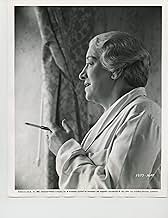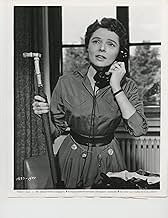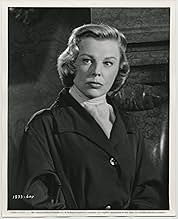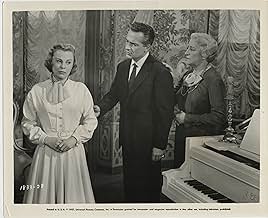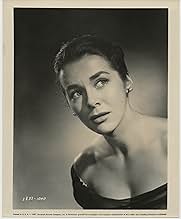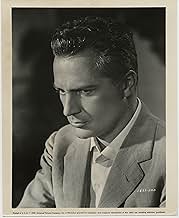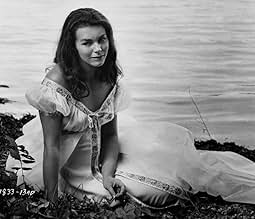Agrega una trama en tu idiomaA young American woman travels to Munich and falls in love with a famous German conductor, only to learn he has a mentally ill wife.A young American woman travels to Munich and falls in love with a famous German conductor, only to learn he has a mentally ill wife.A young American woman travels to Munich and falls in love with a famous German conductor, only to learn he has a mentally ill wife.
- Dirección
- Guionistas
- Elenco
Marianne Koch
- Reni Fischer
- (as Marianne Cook)
Paul Cavanagh
- Dr. Ashley
- (sin créditos)
Opiniones destacadas
A pretty Girl Takes a Job in overseas and meets the charming psychiatrist Morley Dwyer, who isn't from germany either.
Sehr wears a white dress, almost like a bride. So He has the Impression, she ist looking for a 'husband'. And she meets one: Tonio Fisher, a conductor, is soon quite involved, when she met him - she went to see the ego-oriented fellow in his/their place - an old fashioned but impressive landhouse. There she meets his family too. As it turns out - after a stormy night - he is alredy engaged. But the lady in his side seems not happy. In fact, she s about to fight for her future too. Perhaps it' s difficult to just let go, even of there is some other interests, a woman ist left Into (or should I say: left alone?) But it's perhaps the Background, he needs for being the artist...
Sehr wears a white dress, almost like a bride. So He has the Impression, she ist looking for a 'husband'. And she meets one: Tonio Fisher, a conductor, is soon quite involved, when she met him - she went to see the ego-oriented fellow in his/their place - an old fashioned but impressive landhouse. There she meets his family too. As it turns out - after a stormy night - he is alredy engaged. But the lady in his side seems not happy. In fact, she s about to fight for her future too. Perhaps it' s difficult to just let go, even of there is some other interests, a woman ist left Into (or should I say: left alone?) But it's perhaps the Background, he needs for being the artist...
5fs3
Throughout the 50's, Universal-International was home to most of director Douglas Sirk's striking views of life, love and heartache among the American classes. His work with Rock Hudson, Dorothy Malone, Barbara Stanwyck and others in superior films like Written on The Wind, The Tarnished Angels and There's Always Tomorrow is not matched here.
June Allyson on occasion was able to break free from her standard persona with the fortuitous help of the right co-star, director, script turn or moment in time. Here the noble suffering and Rossano Brazzi do not provide the right formula. The stars try (probably too hard) and the trappings are predictably pretty, but the whole affair is rather unfortunately empty.
June Allyson on occasion was able to break free from her standard persona with the fortuitous help of the right co-star, director, script turn or moment in time. Here the noble suffering and Rossano Brazzi do not provide the right formula. The stars try (probably too hard) and the trappings are predictably pretty, but the whole affair is rather unfortunately empty.
As soon as Douglas Sirk's "Interlude" opened to a theme sung by the MacGuire Sisters, I knew that we were not in typical Sirk territory anymore. Usually, the pairing of director Sirk and producer Ross Hunter brought forth brooding melodrama and biting social commentary. However, somewhere here things go sour. June Allyson fails in her efforts to bring epic emotion to the screen and the entire film lacks any real sense of heart and soul. The romantic leading man, Rossano Brazzi, thankfully brings some continental sophistication and feeling to the proceedings. But nothing really saves this movie from becoming a flaccid piece of 1950s celluloid.
Allyson stars as an American visiting Munich, Germany. She happens to meet a bad-tempered conductor(Brazzi), with an even more poorly-tempered wife. His wife suffers from mental illness which drives Brazzi away from her and into Allyson's arms. Allyson, meanwhile, is also being courted by an American doctor without all of the extra baggage. Allyson is torn between the two men and must make a decision before she heads back home to the U.S.
June Allyson was a poor choice as a leading lady for Sirk. Any number of his other female stars would have been great for the role. But, Allyson? I just don't get it. Besides that, she and Brazzi have absolutely no chemistry. There is not one moment in the film where I wanted to see them end up together. The highlights of this film are the lovely scenes shot against the backdrop of a post-war Europe. Also of note for Sirk fans is the heavy use of reflective surfaces and shadows - common imagery in Sirk movies. In the end, however, Sirk, Hunter and the music of Frank Skinner fail to produce anything of substance. Forgettable and slightly disappointing. The 1968 British version of "Interlude" is far superior and highly recommended.
Allyson stars as an American visiting Munich, Germany. She happens to meet a bad-tempered conductor(Brazzi), with an even more poorly-tempered wife. His wife suffers from mental illness which drives Brazzi away from her and into Allyson's arms. Allyson, meanwhile, is also being courted by an American doctor without all of the extra baggage. Allyson is torn between the two men and must make a decision before she heads back home to the U.S.
June Allyson was a poor choice as a leading lady for Sirk. Any number of his other female stars would have been great for the role. But, Allyson? I just don't get it. Besides that, she and Brazzi have absolutely no chemistry. There is not one moment in the film where I wanted to see them end up together. The highlights of this film are the lovely scenes shot against the backdrop of a post-war Europe. Also of note for Sirk fans is the heavy use of reflective surfaces and shadows - common imagery in Sirk movies. In the end, however, Sirk, Hunter and the music of Frank Skinner fail to produce anything of substance. Forgettable and slightly disappointing. The 1968 British version of "Interlude" is far superior and highly recommended.
June Allyson made a career in Hollywood by being the girl next door. She wasn't the lovely girl next door, she was the pug face even the most unremarkable and unattractive could relate to.
She was an awful singer and a mediocre actress. The studios over groomed her. When her career started waning, she married producer Dick Powell which brought her another ten years of work. In Interlude she plays her tired girl next door schtick at the age of 39.
This film was made during the height of the fear of television eating into film ticket sales. Hence the glossy photography and stunning German locations. The script and cast are its drawbacks.
She was an awful singer and a mediocre actress. The studios over groomed her. When her career started waning, she married producer Dick Powell which brought her another ten years of work. In Interlude she plays her tired girl next door schtick at the age of 39.
This film was made during the height of the fear of television eating into film ticket sales. Hence the glossy photography and stunning German locations. The script and cast are its drawbacks.
I have to say that I wasn’t all that looking forward to this romantic melodrama – in view of the fact that it bore the triple threat of classical music, travelogue aspects and a syrupy leading lady in June Allyson! However, director Sirk’s typically glossy handling smooths over much that is icky within this type of film; furthermore, male lead Rossano Brazzi is well-cast as the brooding conductor with a mad wife (Marianne Koch, from A FISTFUL OF DOLLARS [1964]!) – looked after by sympathetic aristocratic relative Francoise Rosay – who tries to console himself with ingénue Allyson (she’s unaware of this set-up, while being herself pursued by doctor/childhood friend Keith Andes). Actually, it’s this element – redolent of “Jane Eyre” – which gives the film its substance; interestingly, while Koch’s character only really emerges during the second half, she’s given a couple of powerful/moving confrontation scenes with Allyson (who even saves her from suicide at one point).
INTERLUDE (a remake, as were a number of Sirk’s famed Ross Hunter collaborations, of the Oscar-winning WHEN TOMORROW COMES [1939] – based on a story by, of all people, thriller expert James M. Cain!) doesn’t wholly escape cliché, however: while initially gruff towards the heroine, Brazzi then tells Allyson he had noticed her immediately and, to make amends, takes the girl sightseeing (the film naturally makes the most of its attractive European locations) and, later, after a romantic picnic is disrupted by a thunderstorm, the couple get to spend the night in a cottage of his conveniently situated nearby. Other resistible ingredients are Jane Wyatt’s mercifully brief appearance as Allyson’s eccentric superior at work (a library within the American Embassy in Monaco), the way most patrons are seen gushing at Brazzi’s talent (he’s merely a conductor, for cryin’ out loud, not a composer or a musical performer!) and, of course, the obligatory title song. By the way, this old-fashioned plot would turn up on the screen yet again – in Britain but under the same title – in 1968 and that version has the benefit of an intriguing cast (Oskar Werner, Donald Sutherland, John Cleese and Derek Jacobi)!
INTERLUDE (a remake, as were a number of Sirk’s famed Ross Hunter collaborations, of the Oscar-winning WHEN TOMORROW COMES [1939] – based on a story by, of all people, thriller expert James M. Cain!) doesn’t wholly escape cliché, however: while initially gruff towards the heroine, Brazzi then tells Allyson he had noticed her immediately and, to make amends, takes the girl sightseeing (the film naturally makes the most of its attractive European locations) and, later, after a romantic picnic is disrupted by a thunderstorm, the couple get to spend the night in a cottage of his conveniently situated nearby. Other resistible ingredients are Jane Wyatt’s mercifully brief appearance as Allyson’s eccentric superior at work (a library within the American Embassy in Monaco), the way most patrons are seen gushing at Brazzi’s talent (he’s merely a conductor, for cryin’ out loud, not a composer or a musical performer!) and, of course, the obligatory title song. By the way, this old-fashioned plot would turn up on the screen yet again – in Britain but under the same title – in 1968 and that version has the benefit of an intriguing cast (Oskar Werner, Donald Sutherland, John Cleese and Derek Jacobi)!
¿Sabías que…?
- TriviaA Los Angeles Times newspaper ad from Oct. 1957 shows that Universal Pictures widely distributed this film as "Forbidden Interlude" on a double bill with Man of a Thousand Faces (1957) starring James Cagney.
- ConexionesReferenced in Behind the Mirror: A Profile of Douglas Sirk (1979)
Selecciones populares
Inicia sesión para calificar y agrega a la lista de videos para obtener recomendaciones personalizadas
- How long is Interlude?Con tecnología de Alexa
Detalles
- Tiempo de ejecución1 hora 30 minutos
- Relación de aspecto
- 2.35 : 1
Contribuir a esta página
Sugiere una edición o agrega el contenido que falta

Principales brechas de datos
By what name was Interlude (1957) officially released in India in English?
Responda
